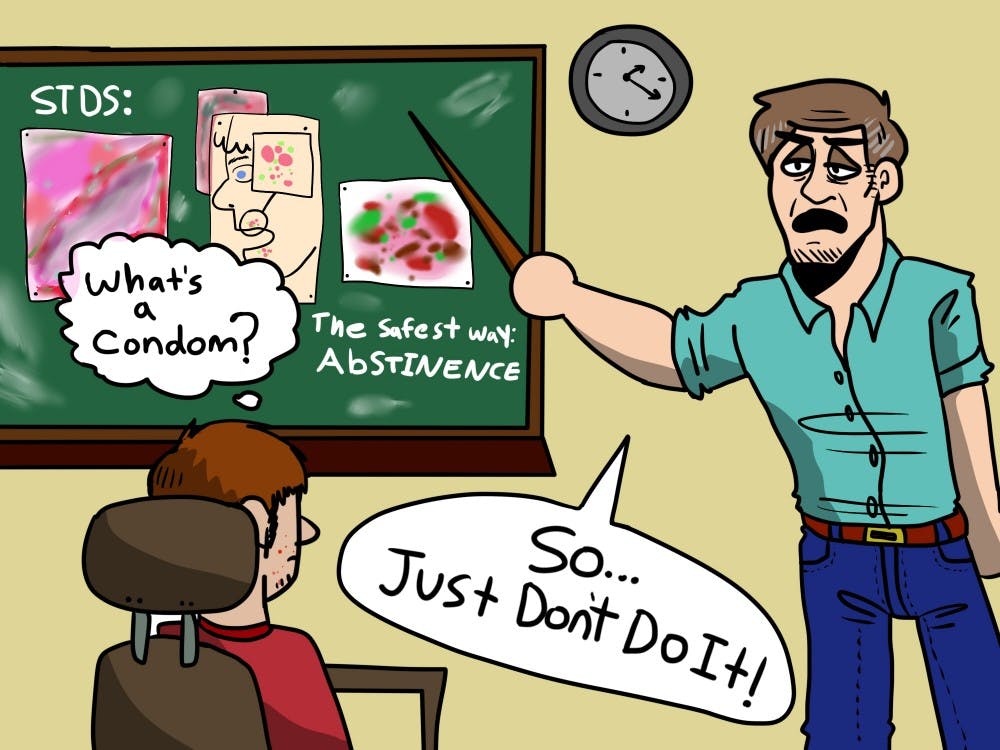Ignoring a problem does not actually make it go away.
Yet, the proposed solution to teen pregnancy is to teach students that the only truly effective way to avoid sexually-transmitted infections and pregnancy is to simply abstain from sex.
Abstinence is easier said than done in a sex-centric society. Between its prevalence in TV shows, movies and social media, the way it is presented as a rite of passage for young adults and the fact that sexual orientation is attached to a person’s identity, it is nearly impossible to avoid.
Thankfully, universities are beginning to remove the stigma from sexual activity and teaching students about safe practices.
In 2015, 51 percent of ASU students reportedly had one sexual partner in the previous year while 44 percent of students had been tested for STIs at some point in time.
The fact of the matter is that abstinence-only education teaches students nothing that they actually need to know to be safe in sexual situations. Instead, it uses scare tactics to discourage them from having sex altogether.
Lee Spencer, an instructor in the department of psychology at ASU, said she has doubts about the effectiveness of preaching abstinence in schools.
“I think it’s pretty much a total failure,” Spencer said. “According to the research that I’m familiar with, (it does) perhaps delay the onset of sexual behavior, but it certainly does not produce a lot of virgin brides.”
Although abstinence-only education is no longer federally funded, it is still maintained by many states in the U.S.
“The problem is if you don’t educate about the other things like safe sex, contraception and STI symptoms ... they’re sort of sitting ducks when they go out there to be sexual,” Spencer said. “They don’t really know how to manage their sex lives in a healthy way at all and they end up with more STIs and more unplanned pregnancies.”
For students coming out of adolescence and going into adulthood, it is important to know how to be safe in those types of situations in order to avoid life-altering events such as an unwanted or unaffordable child or illness.
However, many college campuses, including ASU, are taking the initiative to offer classes on sexual health as well as free condoms and STI testing.
As students go from high school to college, they are more removed from the notion that abstinence is the only reliable method of preventing unwanted consequences and instead introduced to safe practices.
In the U.S., only about 55 percent of men and 60 percent of women who received formal sexual education in schools were taught about contraception.
In the state of Arizona alone, 51 percent of all pregnancies in 2010 were reported as unintended, according to the Guttmacher Institute.
The way young adults are educated about sex forms the basis of a multitude of other issues surrounding family planning. A common argument against insured birth control and funded family planning centers comes from unwillingness to fund the sexual activity of another.
“I think people who complain about Obama’s governmental support of contraception don’t understand that every dollar you spend on contraception, you save seven dollars on social services,” Spencer said. “And if you put women in the position to have babies that they can’t afford, where will they turn? They’ll turn to their state for support.”
The controversy over the necessity of contraception and family planning stems from misinformation or a lack of knowledge on the subjects. The issue would perhaps lessen if people were taught more comprehensively.
Although students often come into college not knowing how to stay safe in sexual situations, the initiatives that ASU is taking can help to undo the damage done by public school abstinence-only education.
Reach the columnist at kalbal@asu.edu or follow @KarishmaAlbal on Twitter.
Editor’s note: The opinions presented in this column are the author’s and do not imply any endorsement from The State Press or its editors.
Want to join the conversation? Send an email to opiniondesk.statepress@gmail.com. Keep letters under 500 words and be sure to include your university affiliation. Anonymity will not be granted.
Like The State Press on Facebook and follow @statepress on Twitter.




